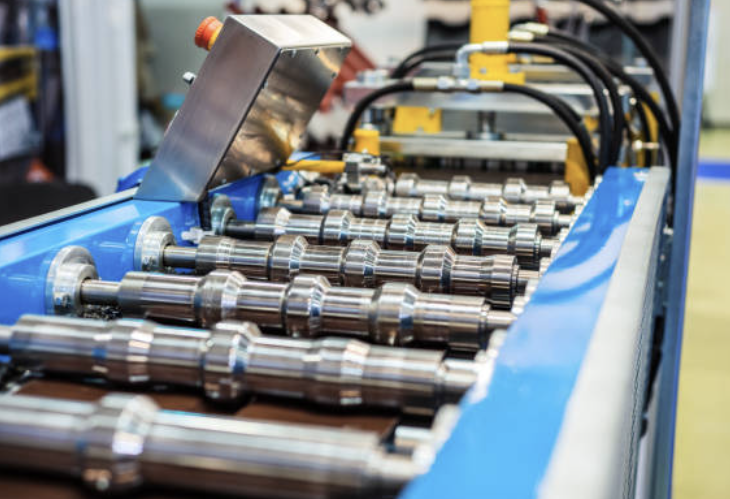
Posted on Thursday, October 31, 2024
In Germany, industries like automotive, construction, and energy are known for their high standards of quality, efficiency, and precision. To maintain these standards, companies in these sectors rely on specialized machinery, like roll forming machines, which enable the mass production of metal parts with unparalleled accuracy and speed. This guide will explore the key German industries that benefit from roll forming technology, specifications that German buyers should consider, and tips for selecting the right machine.
Germany’s reputation as an automotive manufacturing powerhouse is well-deserved. Home to major players like Volkswagen, BMW, and Mercedes-Benz, the German automotive industry is known for producing vehicles that balance performance, durability, and innovation. Roll forming machines play an essential role in achieving this balance by creating lightweight, precise metal components essential to the industry. For example, they are used to form structural parts, reinforcing beams, and panels that meet strict German safety and durability standards while helping to reduce vehicle weight and improve fuel efficiency.
The German construction industry prioritizes high-quality, long-lasting materials that can withstand diverse environmental conditions. Roll forming machines cater to these demands by producing robust metal profiles, roofing sheets, and structural components, all of which are widely used in residential, commercial, and industrial construction. Due to Germany’s focus on sustainable building practices, the ability of roll forming machines to produce energy-efficient materials also aligns with the industry’s green goals.
As Germany transitions towards renewable energy, the demand for components to support this infrastructure is growing. Roll forming machines are instrumental in creating frames for solar panels, structural elements for wind turbines, and conduits for energy distribution systems. These machines help manufacturers meet Germany’s ambitious energy goals by producing components with high strength and durability to withstand environmental stressors while remaining cost-effective.
When selecting a roll forming machine for German industries, buyers need to prioritize several specifications that will ensure efficiency, compliance, and long-term value.
German manufacturers are held to some of the world’s strictest quality standards, including ISO and DIN certifications. Roll forming machines must be able to maintain tight tolerances, deliver smooth finishes, and handle specific materials to meet these benchmarks. Quality control systems built into the machine, like laser measurement and automated inspection tools, can help monitor the accuracy of each piece and ensure consistent product quality.
As part of Germany’s Industry 4.0 movement, companies are increasingly adopting automated solutions that can integrate seamlessly with data systems. Roll forming machines with advanced automation options improve production efficiency and reduce labor costs. Additionally, automated adjustments and data monitoring systems enhance quality control, making it easier to identify and resolve issues in real time. For German manufacturers, choosing a roll forming machine that aligns with Industry 4.0 standards can be a valuable investment in long-term productivity.
In fast-paced industries like automotive and construction, flexibility is key. Manufacturers often require a variety of profiles to cater to different projects and specifications. Roll forming machines that support quick adjustments, adjustable rollers, and interchangeable dies allow for easy customization without lengthy downtime. This adaptability not only increases efficiency but also ensures that German manufacturers can respond to specific customer demands and market shifts effectively.
Another critical consideration is power compatibility. In Germany, most industrial equipment operates on a 400V, 50Hz power supply. To avoid complications, buyers must confirm that the machine’s power requirements align with these standards. Failing to do so could result in operational issues, increased costs for additional equipment, or even safety risks.
Choosing a roll forming machine from a reputable supplier with experience in the German market is highly advisable. Established suppliers often have a solid understanding of local requirements and offer comprehensive support, from installation to ongoing maintenance. Additionally, they may stock spare parts locally, reducing downtime and ensuring that your machine remains operational for longer periods.
Energy costs in Germany are among the highest in Europe, which makes energy efficiency a key factor when selecting any machinery. Roll forming machines with energy-saving features, such as efficient motors and reduced idle times, can help lower long-term operational expenses. Many modern machines are designed with energy efficiency in mind, offering German manufacturers a way to remain cost-competitive while contributing to the nation’s environmental goals.
For German industries looking to invest in roll forming machines, selecting the right model involves more than simply choosing the latest technology. Manufacturers must consider specific needs based on industry demands, quality standards, and compliance with German energy regulations. By focusing on precision, customization, and efficiency, companies can make a choice that will enhance their productivity, maintain quality, and align with the country’s forward-looking industrial strategies.
Selecting a roll forming machine tailored to the needs of German industries is an investment in long-term success. With a machine that meets Germany’s rigorous standards and industry requirements, companies can ensure their operations run smoothly and efficiently, helping them stay competitive in a global market.

Used Purlin Roll Forming Machines for Sale Worldwide
Posted on Sunday, January 25, 2026
Pre-Owned Roll Forming Machines for Purlin & Structural Steel Profiles

Used Roof Panel Roll Forming Machines for Sale Worldwide
Posted on Sunday, January 25, 2026
Pre-Owned Roll Forming Machines for Roofing Panel Production

Used Roll Forming Machines for Sale Worldwide
Posted on Tuesday, January 20, 2026
Pre-Owned Roll Forming Machines with Inspection, Verification & Global Support

Steel Coil Supply for Roll Forming Machines Worldwide
Posted on Tuesday, January 20, 2026
Reliable Steel Coil Supply for Roll Forming, Fabrication & Manufacturing Applications
Copyright 2026 © Machine Matcher.